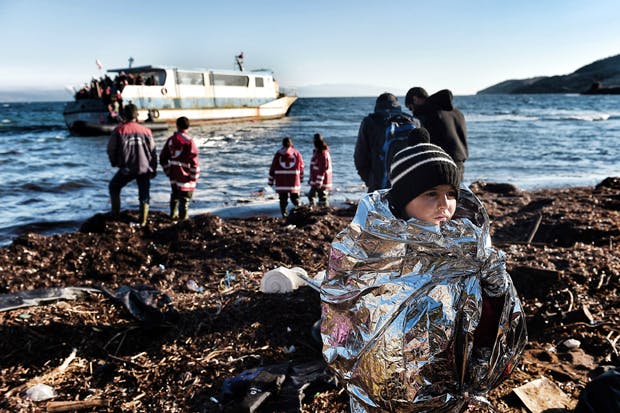For many years, Australia has been turning away boats filled with migrants. From a remove, this looks cold–hearted — a nation built by immigrants showing no compassion for others who want a better life. But it is precisely because Australia is an immigrant nation that it understands the situation: if you let the boats land, more people come. People traffickers will be encouraged, migrants will be swindled, and their bodies will wash up on your shores. Any country serious about immigration needs a more effective and robust approach.
Tony Abbott, the former Prime Minister of Australia, made that point clearly this week on a trip to London. Delivering the Margaret Thatcher lecture at the Guildhall, Abbott, who left office in September, explained what so few European policy-makers seem able to grasp. Yes, the rich world has a moral duty to help people fleeing for their lives. But that duty requires tough action — as well as targeted help — to prevent a genuine flow of refugees developing into an uncontrolled flood of migrants.
It was one of Abbott’s predecessors, John Howard, who in 2001 faced the decision of what to do about a Norwegian freighter which had entered Australian waters with many Afghan asylum-seekers on board. He turned the boat away on the grounds that, while they may have begun their journey as refugees, they had transmuted into economic migrants. It is not possible to make a surface journey from Afghanistan to Australia without passing through the territory of several safe countries on the way. The ship had called at several ports in countries that were not at war and where the Afghans would not have faced persecution. Why had they not disembarked before reaching Australia?
The answer, of course, is that they believed Australia would offer them the best chance of a more prosperous life. This is the very impulse that created modern Australia, Canada and the United States.
But Howard and Abbott were right to insist that the world has changed since those times. The migration crisis today is not due to an outbreak of war and poverty: we’re living in an unprecedented era of peace and prosperity. In fact, this is what is driving the migration — people who had been too poor to consider emigrating now have enough cash to make the journey. They have smartphones, and know about life abroad. The sheer speed at which global poverty is being reduced has put millions on the move.
Study after study shows that emigration starts in earnest when very poor countries grow richer; it only stops when countries are rich enough not to be classified as ‘poor’. This process typically takes a couple of generations. So the wave of migration we are witnessing in Europe is not just a response to the Syrian war; is a phenomenon that will be with us for decades.
With migrant boats landing from North Africa, European countries could have learned lessons from the Australian experience. Instead, they have flapped around making things worse. The EU was right to set up search and rescue missions for migrants in danger of drowning in the Mediterranean — but the passengers should have been returned to whence they came and the traffickers prosecuted.
Nothing demonstrates the muddle better than the bizarre behaviour of Germany over the summer. Angela Merkel at first welcomed the migrants with open arms and suggested that countries which took a more reluctant approach, such as Britain, lacked a moral compass. But Germany does not now resemble the warm-hearted country that Merkel wants to present to the world. Tensions are rising, as Hans Kundnani points out on page 12. The influx has reactivated neo-Nazi groups, with vigilantes patrolling migrant areas. As a leaked paper from German security agencies revealed this week, the government fears that it is importing anti-Semitism along with its migrant population.
Dramatic though the scenes are at Munich railway station and the Eurotunnel terminal at Calais, these are mere sideshows compared with the refugee issue as a whole. The country with the most Syrian refugees at present is not Britain, Germany or France. It is not even Turkey or the Lebanon. It is Syria. According to the United Nations, there are 6.5 million people displaced within their own country. A further 2.1 million are living in Turkey and 1.1 million in the Lebanon. Disgracefully, the UN’s World Food Programme has had to cut rations for refugees living in camps around the Syrian border, for want of donations from rich countries. David Cameron’s approach has been right and fair: focus on helping people in the places where they most need help, and don’t make British residency a gleaming reward for people traffickers to dangle before their desperate clients.
European countries and the EU itself have enormous aid budgets which have been spent on fripperies such as low-carbon energy projects in sub-Saharan Africa. It is about time Europe spent more of this money on dealing with humanitarian crises where they arise — while simultaneously adopting an Australian robustness when it comes to border protection. As Europe is finding to its horror, the alternative is anything but compassionate.
Got something to add? Join the discussion and comment below.
Get 10 issues for just $10
Subscribe to The Spectator Australia today for the next 10 magazine issues, plus full online access, for just $10.














Comments
Don't miss out
Join the conversation with other Spectator Australia readers. Subscribe to leave a comment.
SUBSCRIBEAlready a subscriber? Log in